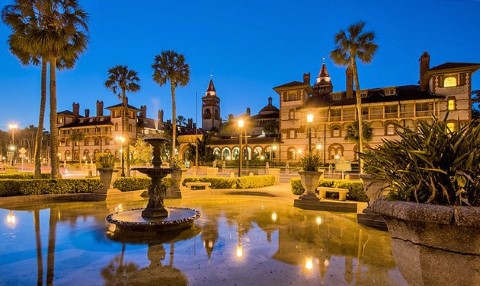×
QuicknavManagement Center Innsbruck
- Mein Studium
- Services
- Student Life
- Student Life
- International
Flagler College

Year of foundation: 1968
Approx. number of students: 2,800
Period of study: End August-Mid December; Early January-End April
MCI partner since: 2016
The county seat of St. Johns County, it is part of Florida's First Coast region and the Jacksonville metropolitan area. According to the 2010 census, the city population was 12,975.
Saint Augustine was founded on September 8, 1565, by Spanish admiral and Florida's first governor, Pedro Menéndez de Avilés. He named the settlement "San Agustín", as his ships bearing settlers, troops, and supplies from Spain had first sighted land in Florida on August 28, 1565, the feast day of St. Augustine. The city served as the capital of Spanish Florida for over 200 years, and became the capital of British East Florida when the territory briefly changed hands between Spain and Britain. Spain ceded Florida to the United States in 1819, and when the treaty was ratified in 1821, St. Augustine was designated the capital of the Florida Territory until Tallahassee was made the capital in 1824. Since the late 19th century, St. Augustine's distinct historical character has made the city a major tourist attraction. It is also the headquarters for the Florida National Guard.
The college has been named by U.S. News & World Report as one of the "Best Regional Colleges in the South" and in The Princeton Review "Best 380 Colleges."
http://www.flagler.edu/
Zurück
Approx. number of students: 2,800
Period of study: End August-Mid December; Early January-End April
MCI partner since: 2016
The City
St. Augustine (Spanish: San Agustín) is a city in northeastern Florida. It is the oldest continuously occupied European-established settlement within the borders of the contiguous United States.[6]The county seat of St. Johns County, it is part of Florida's First Coast region and the Jacksonville metropolitan area. According to the 2010 census, the city population was 12,975.
Saint Augustine was founded on September 8, 1565, by Spanish admiral and Florida's first governor, Pedro Menéndez de Avilés. He named the settlement "San Agustín", as his ships bearing settlers, troops, and supplies from Spain had first sighted land in Florida on August 28, 1565, the feast day of St. Augustine. The city served as the capital of Spanish Florida for over 200 years, and became the capital of British East Florida when the territory briefly changed hands between Spain and Britain. Spain ceded Florida to the United States in 1819, and when the treaty was ratified in 1821, St. Augustine was designated the capital of the Florida Territory until Tallahassee was made the capital in 1824. Since the late 19th century, St. Augustine's distinct historical character has made the city a major tourist attraction. It is also the headquarters for the Florida National Guard.
The University
Flagler College is a private four-year liberal arts college located in St. Augustine, Florida, United States. It was founded in 1968 and offers 29 majors and 34 minors.The college has been named by U.S. News & World Report as one of the "Best Regional Colleges in the South" and in The Princeton Review "Best 380 Colleges."
http://www.flagler.edu/
Zurück
Wir nutzen Cookies auf unserer Website. Einige von ihnen sind essenziell für den Betrieb der Seite, während andere uns helfen, diese Website und die Nutzererfahrung zu verbessern (Tracking Cookies). Sie können selbst entscheiden, ob Sie die Cookies zulassen möchten. Bitte beachten Sie, dass bei einer Ablehnung womöglich nicht mehr alle Funktionalitäten der Seite zur Verfügung stehen.

